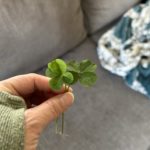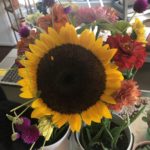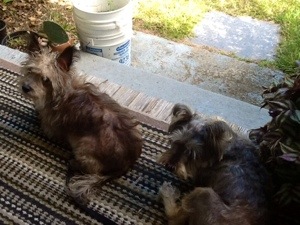Uncategorized
now browsing by category
Of Promises, Nostalgia, and Expectations
My last post is so hopeful, so excited, so full of promise of posts to come.I remember thinking: If nothing else, this class will at least generate some posts. I suppose it would, and will, generate posts when I get to attend another class. Yes, we were supposed to meet every other Wednesday, but since that first meeting there have been at least two weather delays, and an out of town conference for me. I’m really looking forward to attending class again this week. Since I missed the last session, I almost feel like we will need to do introductions all over again.
About that conference … It was pretty great! As a board member for the organization I had quite a few meetings to attend, but it was wonderful to see old friends and colleagues, and to make new acquaintances. The keynote speaker, Dr. Vershawn Ashanti Young, was amazing, and I’m still processing and learning from his presentation. Our homework from his presentation was to watch Dr. Joni Jones speech about 6 Rules for Allies. Take 13 minutes from your day and watch it now. I’m figuring out how to incorporate this into various staff meetings now.
After the conference I got very ill, some sort of stomach thing that kept me out of work on Monday, which was not great because then we lost Wednesday – Friday to snow days. (I refuse to name winter storms.) Every year in NC we have a snow day or two, many of them unnecessary concessions to the weather hype. Every few years, however, there is a real snow event, one in which there is both an actual accumulation of snow, and the usual layer of ice. This was one of those years. Lots of snow on the ground, then ice, then snow, then melt, which leads to more ice. Most of it has cleared out by now, but as I trudged around to the grocery store and coffee shop the last couple of days, I found myself missing the mid-west. It is crazy, but I always feel energized by a good snow. It’s probably just because they are so infrequent around here. I’m sure the first time I actually had to deal with a full winter’s worth of snow again I would not feel so enamored of it all. For the last couple of days, however, I was able to feel that warm, fuzzy, nostalgia for a day of bright and glorious winter sun shining off a blanket of freshly fallen snow.
Part of the hope, excitement, and promise of those early New Year’s posts is that I felt like this would be a year of changes. Also, I thought I knew what those changes were likely to be. Turns out I might have been counting chickens before the eggs hatched. I still expect there to be some significant changes in my life this year; now, however, I’ve learned to keep those expectations a little more vague. None of which is really meant to be vague with you, dear reader. I just really don’t know what will happen. I just know that last year contained some pretty big closures – graduating, turning 40, etc, which means that there are spaces to fill in my life and we all know how the universe hates a vacuum.
Good-bye Comfort Zone Re-Post
Apparently Visibility and Vulnerability are words for this year because on Wednesday this week I attended my first of many Performance Leadership (PL) classes. PL is a professional development class the university runs for mid-level managers — typically staff, which means it is a class full of just about everybody from dining services, business operations, engineering and agriculture extension programs and me. We meet every other Wednesday between now and June, and I am ridiculously excited about this class. At the end of day one I told our facilitator that I was sitting there thinking, “How do I get this job?” She said that as I presented she was thinking I would be good at it. I have no career change in mind just yet, but it is nice to see something else I think I would enjoy.
Half of it is just being in a class environment again, even if it is this kind of training class. It would be impossible for you to over-estimate how hard it was for me doing my dissertation alone and not in a classroom environment. (Yes, part of the point of dissertation writing is learning to work on your own, but for me … it sucked. I like to talk through ideas.) I was so excited for this class that I made a 3-ring binder to keep my materials, got a new notebook and special pens. Then, I got to class and at every seat was a 3-ring binder. I felt more than a little silly and Lisa Simpson-esque. By the end of the day my table mates were giving me a hard time … “Of course you‘ve done the pre-reading” kind of stuff. In their defense, by that time I’d also volunteered to go first for an activity. Basically, I brought the teasing on myself – and it really was good-natured.
Seriously though, as much as I love the classroom environment (meeting new people, learning about them, sharing ideas), just being in this class is a step outside comfortable for me. While I have often found myself in leadership roles, it has never been something I embraced (or cultivated) about myself. I was raised in an environment where I was constantly reminded not to “get above” myself. Since I also have an ingrained respect for leaders labeling myself as one by participating in this class triggers all the insecurities that go with “getting above myself.”
Unsurprisingly, taking this course feels a little like reaching above my station, but then pretty much everything I have ever done has felt like that. As long as I can remember my mother has called me “Champagne,” and talked about how I have champagne-taste on a beer budget. She’s even gone so far as to make the overt comparison that I am champagne and she is beer. So, I guess I come by this disconnected, over-reaching feeling honestly. It shouldn’t surprise me that — despite the fact that my parents have both been managers/leaders of a sort — head housekeeper, lead mechanic, bar manager, shop foreman, — sitting in a management class learning about leadership feels a little strange.
Now, having stepped out of that comfort zone and admitted that I am leading people — and that I want to develop that skill — every part of this class that will push me is just that much farther away from safety/comfort. In fact, one of the first things we have to do is giving me hives just thinking about it. Sometime in the next week or two I have to send an email to my bosses, peers, and employees, and anyone else I can think of asking them to complete a review of me. Their review is completely confidential. The facilitators of the program gather the responses and compile them into a report that I will go over with my leadership coach. Sure, I understand how this information is necessary and will help me, but I am quite afraid to hear what other people think of me.
Vulnerable sounds like just about the right word for how I will be feeling all semester.
Staff Activity
First let me state, the WordPress app is not on my happy list today. As I sat at Panera this morning drinking my coffee, I wrote a nice long post that disappeared into the ether as soon as I hit publish. Really, it’s not even in my drafts anymore. Thinking about it, though, you – Dear Reader – are perhaps okay with this disappearance. While not a horrible post, I’m not sure how exciting it was. I didn’t even have any good dog pictures at the bottom to reward you for slogging through it all. Don’t get your hopes up, this post won’t be too exciting either, but I’m hoping it will at least be useful.
Choosing Visibility and Vulnerability as my words for this year wasn’t exactly a random choice. I have known since the middle of last semester that this year I would be participating in a Performance Leadership class this semester. The class meets every other Wednesday between now and June, and our first meeting was this week. This class is already pushing at me and my boundaries, and being really useful. Our first group project was part art/part confessional (in a good way).
Our first class activity was designed to get introduce us to each other. Generally, I am not one for these kind of ice-breaker/introductory activities, but I thought this one finally felt useful.
So great, in fact that I actually modified it for my beginning of the semester undergraduate writing center staff meeting.
The challenge for me (and the staff) this semester is making sure that the new people easily integrate into the center staff. Most of the time I do just hire 2-3 people at a time, but last semester was a little freakish. There was almost a complete turn-over in the staff. I had to hire 10 people. It was great because they bonded during their training class, but has the potential to be not-so-great for the new people this semester. To help ameliorate this process I decided to adapt this activity from the Performance Leadership class into our training. I did this new version again with them.
First they had to draw a badge like this:
One this badge they had to put: Three Values, Three Hobbies, and Three Strengths. The tricky part is that no words are allowed, only pictures. Once all the pictures have been drawn each person stands up in front of the group and tells the story of their badge. Here’s mine (Remember the DH is the artist in this family.):
Yes, it is terrible. I’m pretty sure my 2 1/2year old niece can draw better than I can. I don’t have it with me or I would show you my actual badge from the PL class. It’s even *better*. In addition to not being able to draw, I apparently have no sense of space and proportion either. But, here’s my story. My values are hospitality (the person at the door waving people in), justice/fairness, diversity/family (all the people are the same, not a good representation of diversity, but there were limited markers.) My hobbies include walking/playing with the dogs — yes, those are supposed to be dogs. Watching TV, which is represented by the gladiator in the red suit. Also, I think you can see the crocheting yarn & hook. My strengths, I think, are listening — you try to draw an ear. Being friendly … okay so normally I do smiles a little better, and the light bulb is to represent helping other people figure our their ideas.
The fun part of this activity is that a lot of people might list the same values/strengths, but they all represent them and talk about them differently. For each person we talked about how their values and strengths could work well for them in the writing center. I had fun and it felt like everyone else did as well. I suppose I will only figure out over the course of the semester how well it helped the new consultants fit in with the existing staff, but I think it was worth while after all.
Happy New Year
In an event worthy of a national holiday, today I left the house and met new people. Dr. Cheese is in the ‘boro for the holidays to see his family and came east today to see friends, so I tagged a long in order to spend some time with him. There was so much good food, and a ton of kids. Fun times! Since I already have two social engagements for this weekend: book club Friday night and coffee with the Anthropologist on Saturday, I think I can safely declare my hermit phase over. For someone who was known as a ‘social butterfly’ in high school, my lack of social life here in the Bull City has been trying at times.
While I am not really a resolution person, I have found over the past couple of years that it is helpful to have a slogan for the year. In the past I’ve focused on things like confidence, listening. Basically, I just pick a word to use a benchmark for my decisions and actions. Typically, this is something I do mostly at work, but this year I’ve chosen two interconnected words that I think will have an impact in every part of my life. This is the year of Visibility and Vulnerability. I don’t know exactly what it all means yet, but I know it will be a challenge to make myself open up this year.
Not much of a post tonight, but at least I started out the year with writing!
Howdy Stranger – Let’s get reacquainted!
Well, I made it through all the October deadlines. Of course, there is a whole new crop of November deadlines to face. At least in November the writing community becomes a little more visible with all the [fill-in-the-blank]WriMos going on. Yes, I did in fact join the Aciwrimo (academic writing month). I put my name in the spreadsheet and everything. I needed a writing kick-in the butt, plus some accountability, so it seemed like perfect timing. Also, the Cajun Princess and I have to write a book chapter this month, which is very good news that makes me nervous. The two things I discovered during the dissertation process is that I like accountability and I like to talk about my writing, especially when I’m making progress. While I’m fairly certain that you, dear reader, probably wish I’d skipped that discovery, talking about my writing helps me to work through blocks and to stay motivated when I’m on a streak. I am sure you can see why all this WriMo stuff appeals to me.
Despite my late freshman English’s teacher’s best efforts to turn us all into positive thinking goal setters, I’ve never been much of a goal setter, and even less of a goal keeper. I’m hard wired to let myself off a little too easily and to adapt and just go with the flow instead of sticking to a set path, so I let life take me where it will. All in all I like that about myself. My adaptability has certainly been my strength at nearly every job I’ve had because I’m used to figuring out how to make something work. One of the good/hard things for me about AciWriMo was figuring out how to set a goal for myself. Writing goals are malleable and nebulous, would I:
-
Write everyday, or just 5 days a week?
Write for a certain amount of time? How would I count that time?
Write a certain amount of words per day, per week, per month?
What types of writing would count? (Does a blog post count for “Academic” writing month?)
Finishing a certain project?
You get the picture. Certainly the book chapter is my focus this month, but that is far from my only writing task. There are still conference CFP’s, article reviews, job letters and essays (Different post, but yeah one school assigned a 2 page essay?!), and definitely at least five things I’ve forgotten to list here. Since I have so many different projects on my plate right now, I decided to set a monthly word count goal. Keep in mind that the AciWriMo organizers encourage setting a goal that is just a little bit crazy in order to push yourself a little to meet it, and naturally they encouraged sharing that goal publically.
My writing goal for November is 12,000 words.
That might not sound like a lot, but it averages out to about 400 words a day. Looking back at my dissertation spreadsheet, I realized that during good writing streaks I averaged about 300 words a day, so I thought an extra 100 words was a good stretch. I will try to keep my writing about my writing to a minimum, but I think there will definitely be a few posts about what is/is not working for me. However, there are also some fun posts coming up too. I have some pictures to share, and some thoughts about the current crop of strong girls (Katniss & Tris) in YA fiction.
Also, blog posts definitely count! 😉
I finally got a good picture of what it is like when I sit at my writing desk.
Too Much and Not Enough
For whatever reason, the stars have aligned turning this October into the month of ALL THE DEADLINES! Really, there are 3-4 CFP’s with deadlines between October 15 – 25th (and those are just the ones I’m interested in). Consequently, one of the ways I’m avoid the massive pile of grading that must be done before tomorrow (okay Wednesday at the latest) is to feel productive by working on these CFP’s.
The CFP I’m working on this weekend, which is simultaneously the least related to my professional work and the one in which I am most invested, is for a book chapter in a book about first generation & working class graduate students and faculty. Given all my discussions here about being working class in graduate school/the academy, you might think this project would be coming along nicely.
HA!
The current draft of my proposal consists of an unusable paragraph, complete with strike-through.
Since I spent my entire dissertation writing process thinking, “Wow! That really works.” whenever a writing center technique would come in handy, I figured I would start with the basics, with something I counsel writer’s to do when they are stuck — go back to the prompt. While the prompt hasn’t provided me with an epiphany just yet, it has made me realize the problem.
Like most CFP’s this one includes a nice list of suggested topics/areas of interest on which writer’s might like to focus.
-
Cultural Difference
Academic Preparedness
Integration
Professionalization
Economic issues
Work-life balance
Social and cultural capital
Family responsibilities and relationships
Peer relations
Mentorship Strategies and relationships
Academic and social skills
My problem here is not necessarily a bad one. The problem is not that I don’t have anything to say about the items on this list; the problem is I could probably say something about every item on this list. In this case, having too much to say is just as problematic as too little, because I completely lack focus. Sure, I could talk about nearly every item on this list, but that doesn’t mean I have something useful to say about them all. The difficulty lies in figuring out my “So, what?” Why and how has being a working class/first-generation graduate student/faculty impacted me the most; and, what might be useful for someone else in that story?
At the coffee shop this morning I returned to Donna LeCourt’s Identity Matters, which is my go to place for starting to think about class & education. Modifying Sharon Crowley’s claim that inexperienced writer’s are better able to see the “differance” in a discourse, LeCourt argues graduate students (particularly first generation/working class) serve the same role in the academy. (I’ve probably tried to oversimplify here, so please do check out LeCourt & Crowley.)
The struggle I face is picking out the moment that resulted in the most clear conflict between my working class identity/values and the expectations of the academy. Here’s where it all get a little sketchy, because there is so much and it is all so inter-related that I’m having a difficult time picking out the unifying thread. What I currently think, however, is that there is something for me to write about in the difference between my response to crisis and the “time to degreee” expectations.
Yes, a stroke is rare, and could happen to anyone during their graduate work, and it isn’t necessarily a “working class” or “first-generation” issue, but my response to that crisis is what I think most clearly brought my working class identity/values into conflict with the academic demands made on me as a graduate student.
Now, I just have to figure out what it all means and send in a 500 word abstract. 😉
And, since you’ve been patient enough to let me talk-it-out here, I give you PUPPIES!
Forks in the Road
Although I’ve been thinking a lot about Casie’s list of activist advising questions for students considering careers in academia, and I had planned to do a series of posts answering some of those questions, that plan began to feel a little disingenuous.
Here’s a refresher of those questions:
What is it you like about academia? Specifically, what practices make you happy?
What parts of academia stress you out or make you upset?
Is it important that you live in a specific city, state, or region?
What kind of financial compensation do you need to be happy?
What sort of daily or weekly schedule do you envision as your ideal?
Is teaching/research/administration a practice that you could envision yourself engaging with over time?
What feelings do you experience when you think about not working in academia?
What kind of job could you imagine yourself doing and being happy?
Do you like to research and write?
How do you deal with timelines and independent goal setting?
If you had to describe your ideal day at work—from waking up to going to bed—what would that day look like? What challenges might you encounter? What high points might you experience?
What identities do you call on when you consider your self-worth? Your values? How do you prioritize these identities?
While I still think that it is worthwhile to keep many of these questions in mind throughout your career, the disingenuous part of my reflection plan is that I already have a career in academia. It might not be the traditional tenure-track assistant professor gig, but I am now three years into the system. If I truly wanted to, I’m positive I could find a way out, but for now at least I’m not that motivated to get out. Recent events (graduation), have however, made me re-think my position in the academy.
That last question, “What identities do you call on when you consider your self-worth?” That is the question driving me the most right now. Although, since going back to community college in some way shape or form I’ve been a student since 1995, I am now officially done. No more student. Given the duration of my time in and out of schools, you might suspect this would be a bigger identity crisis than it really is. As typically happens with me, the strange backwards way I find myself doing things actually works to my advantage in some way. Taking a full-time job before I had finished my dissertation actually worked for me in terms of my identity. For the last three years, I’ve been cultivating a new identity through work. My professional identity primarily got me through that last stage of dissertation writing because having a job made me want to be done being a student. Since, as I said before, the only way to get done was to work through it, I did it. The more I built an identity as a writing center administrator by working all day, presenting at conferences, and joining professional organizations, the more vexing it became to continually have interactions that placed me firmly in my “student” identity.
Now, however, my professional identity as a writing center administrator is somewhat at odds with the identities I feel most tied to my self worth because it only addresses one aspect of the academic triumvirate – administration. Teaching, researching, and writing are supported to an extent in my current job, but they are not a part of my official job description, of which I am occasionally reminded. Teaching is more supported, as long as it is in direct service to my administrative duties. (I am expected to teach tutor training courses, but nothing else.) Yes I am funded to go to conferences, but the papers I give, if written at work, should not take away from my primary duties of staffing and promoting the writing centers. None of this makes my job horrible, in fact I really like what I do, but it does mean my job doesn’t fit me as well as it might.
As difficult as I find it, and as scarred as I might be by the dissertation, some of my identity is wrapped up in being an academic writer. The silver lining of this crazed, hectic semester is that it helped me identify when I am least happy at work. Being out of the office for classroom visits and a ton of presentations, constantly needing to prep for a class or staff meeting, putting out the various fires of trying to add another center to an already crowded space, there has been no time for me to read/research and write. Consequently, this last week when I finally did have 20 minutes here and there to think about the 3-4 CFPs with October 15th-ish deadlines, I couldn’t write. I had nothing to say, which as you might guess is fairly rare. What I learned this week is that being an academic writer is one of my identities and that it holds some value for me because when that identity is not supported by my work environment it makes me unhappy; it makes it harder to focus on what I do like about my job.
Here comes the fork in the road.
The question now is what I do to make sure my identity as an academic writer is a part of my work. The thing about working at a large research institution is that change is incremental at best and glacial at worst, so I don’t necessarily see my present working conditions or classification changing any time soon. Sure, my schedule will free up over the next couple of weeks, and if I can churn out some proposals, I should be able to then go back and get back into my writing. Writing and research will not, however, become a larger part of my job description any time soon. As you might have guessed, yes, this does mean I’ve been keeping an eye on the job lists and considering applications for more traditional tenure-track, assistant professor, types of positions. All of which, as you can imagine, means there will be some serious navel gazing going on around here for a while as I give some serious thought to both my answers to the above questions, and whether or not I want to further entrench myself in academic life. Because, although I just identified “academic writer” as an important way to think about myself, there are regions of the country where it is important for me to live; as the person with the primary income in my family, financial compensation is important; there are values and identities I hold that have the potential to conflict with a deeper engagement with the academia. The more I work to pull together materials, and apply to different positions, the more questions I have about whether or not this is the way to go. The reality is probably that it is the path I am already on, and that I need to give up the questioning and doubt to just get it done.
For now though, at least it gives me something to write about.
Timing and Hearing
Before tackling Casie’s list of questions listed in my “Staying and Going” post and making my own decisions about academia, some of which may be more public than the rest, I’d like to consider the other side of the activist mentoring equation, the student.
Although it is difficult now to remember, I was once an MA student trying to decide whether or not to continue on into a PhD program. I’d come south to find an MA program that would also provide me with community college teaching experience, because I thought that was what I wanted to do. Like my mentor from community college, I thought I could be happy teaching at a CC by day and doing community theatre at night. A couple of things happened a long the way that made me question that idea. I started teaching at a cc and I started learning more about composition. I still wanted to teach, but I was no longer sure I wanted to pursue the cc track. I was also no longer sure an MA would be enough on the cc track. As I participated in a “Facutly-in-Training” program at the local community college, the English department announced a TT position, and I got an inside look at the application process. Sure enough, although the ad said the magic words “Ma required” those were quickly followed by “PhD preferred,” and of course the position went to someone with a PhD. I began to understand that, even though the PhD is a “research” degree, I would need it if I wanted to pursue a “teaching” career. Consequently, when the DGS called me in for an advising meeting and said, “Hey! You could graduate this semester,” I kind of freaked out. With only an MA, I knew without a doubt that I would end up an adjunct. Plus, I felt like I wasn’t done learning yet. Naturally, I turned to my favorite professor for advice.
Here you need some context.
The best words to describe my favorite professor were mercurial, cantankerous, and gloomy. Those might sound like odd words to describe a mentor, but really … when she was “on,”she pushed and expected the best of you, and you wanted to give it to her. She was also brutally honest about the academy, the market, and not staying where I was for my Ph.D. work. Here’s the thing. I heard every word she said, and I considered it, but then I continued, and I stayed. Not because I thought the market was getting any better. I stayed because I knew I would need the degree, because, as loose as it was, I had a network in place, and because she was there. The good news … I have the degree and my network of friends and family only grew during my Ph.D. work. The bad news, just before my comps that favorite professor of mine left, leaving a hole in my committee that didn’t get permanently filled until I started writing about writing centers.
Over the past few years I’ve worked with several graduate students, and I would say I’ve been a mentor to a couple of them. One has chosen to go on to do her PhD work. Without being as gloomy as my mentor, I did my best to ask her the tough questions, and paint an accurate picture of graduate school and the professions. I challenged her with some of the questions in yesterday’s list. Still, she’s half-way through her first semester of a PhD program. Yes, this is just one of the ways I see myself in her. However, having been through it all now, I think there is something else at play as well. I think that even the best advice has to come at the right time, because there are points in time when we are just incapable of really hearing/processing it. Some experiences, I think we just have to have.
Of course this doesn’t change the need for more activist mentoring, because for stubborn person like me (or my former consultant), there are students who need to be asked the tough questions. Students, who will use the answers to make informed decisions, and hopefully won’t end up at the end of a PhD program feeling as if they’ve been bamboozled.
Staying and Going
My friend Casie posted this today.
I have a couple of responses to this piece, but the primary one is … yes! Just, yes! That I agree with Casie really isn’t a surprising thing.
We first met at her job talk when I walked up to tell her how much I enjoyed her presentation, and before I could get two words out found myself in tears. True story. Honest-to-God tears, accompanied by those “I’m trying not to cry, but it only makes it worse sobs.” She was gracious enough to give me a hug and let me stumble through my little speech. It was my first year on the job and to describe myself as mortified would be a little bit of an understatement. Still, there were few happier moments in that first year then when I heard she had accepted the position.
What could make someone cry at a job talk?
Valid question.
Some of it was probably the stress of my first year. Few periods in my life have been as lonely and as exhausting. The commute, adapting to a completely new work schedule & environment, being the primary source of income for my family, and on top of it all still being a graduate student — I’ve talked before about how all those things add up, and how for me when the stress adds up it usually results in tears. I’m an equal opportunity crier – if I’m sad, I cry; if I’m angry, I cry; if I’m frustrated, I cry; if I’m happy (you guessed it), I cry. In this case it was recognition.
These days it seems like everyone and their second cousin is talking about what it means to be a working class academic, and about the working conditions for graduate students and non-tenure-track faculty. Three years ago, however, it wasn’t exactly the same. Three years ago being a working class academic was just something Ouiser and I talked about sitting on the garage couch when we were in our cups. Ouiser was the first person I knew to start talking about alt-ac careers and the irresponsible mentoring of graduate students. Consequently, when I sat listening to Casie’s job talk about her research with working class academics, it touched something in me. What I meant to say, and what I hope came out between my tears, was that hearing about Casie’s research was like finally being seen. It was the first time I’d heard an academic describe graduate students who could have been me. It was a naming and a calling into being.
So, I guess you can imagine why three years later I find nothing out of the ordinary about once again seeing Casie give voice to thoughts that have been floating around my head. The only thing different is, perhaps, the context. In her post Casie outlines this great list of questions for graduates to consider as they ponder pursuing a PhD and the academic life.
What is it you like about academia? Specifically, what practices make you happy?
What parts of academia stress you out or make you upset?
Is it important that you live in a specific city, state, or region?
What kind of financial compensation do you need to be happy?
What sort of daily or weekly schedule do you envision as your ideal?
Is teaching/research/administration a practice that you could envision yourself engaging with over time?
What feelings do you experience when you think about not working in academia?
What kind of job could you imagine yourself doing and being happy?
Do you like to research and write?
How do you deal with timelines and independent goal setting?
If you had to describe your ideal day at work—from waking up to going to bed—what would that day look like? What challenges might you encounter? What high points might you experience?
What identities do you call on when you consider your self-worth? Your values? How do you prioritize these identities?
Having finally finished and received the PhD (which I somehow still think will be rescinded every time I find another mistake in my dissertation), I find myself looking at the academic job market. I’m considering which jobs and which locations would be right for me, without necessarily thinking about whether or not this is really want I want. Yes, at this point it is what I’m trained to do, but does that necessarily mean it is all I can do, or that it is even really what I want to do? Technically, I am already in academia, and I don’t know that I could answer any one of those questions. I think I am at a point, like the MA student, where it is necessary to decide do I stay or do I go?
Fall Changes
Fall has always been my favorite time of year. Perhaps my birthday had something to do with that as a child, but school was always a part of that as well. The first day of school was exciting for me because it meant a change of pace, and a new order to the day.
Now that we live in the South fall has become even more important to me. The most magical day of the Southern year happens in fall. One day in mid-September the humidity just turns off. Life becomes tolerable again and I can turn off the ac and still sleep through the night. I can stand to touch yarn again, and pick up all the projects I’ve ignored over the summer. There is a gift I need to finish, and I’m finally feeling the momentum picking up to get it done.
This fall digital changes have happened here at Sur le Seuil as well. In an effort to get my digital life in order, I finally bit the bullet and bought a domain, and have been working on getting this site in order. The CV is up, as is a rudimentary About page. Now, I just have to figure out what to put on the Home page. The only thing harder for me than coming up with a title is writing something like a bio or About page. I’m certain it will be corny around here for a little while.











 D5 Creation
D5 Creation